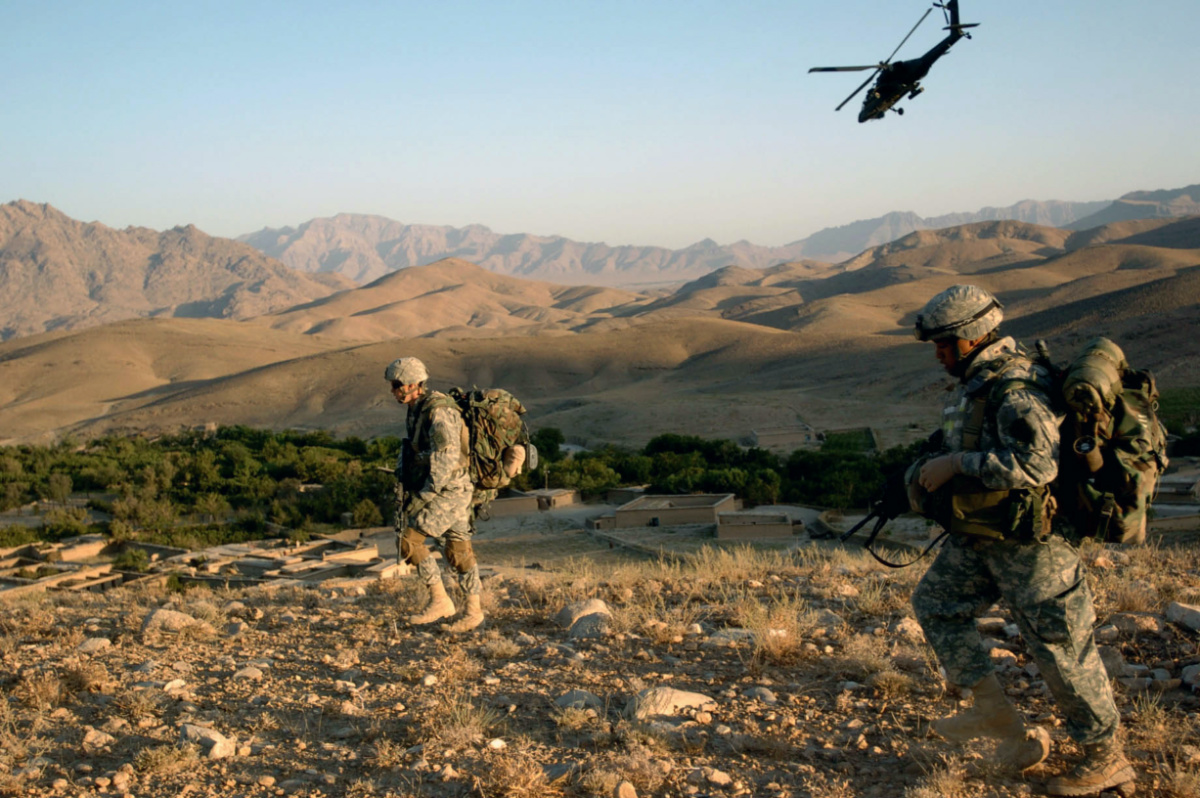
In an article published by Religion News Service, DIANE RANDALL, general secretary of the US-based Friends Committee on National Legislation, says it’s “clearer than ever the global war on terror has been an unmitigated humanitarian and strategic disaster”…
Late on 7th October, 2001, less than a month after the 9/11 attacks, American fighter jets swept over Afghan skies. This moment marked the opening of the war in Afghanistan, and more broadly, the beginning of our “war on terror.”
As the fighting began, peace advocates across the world knew what lay ahead. As with any war, there would be needless deaths, horrific destruction and terrible tragedies.

An Apache helicopter provides protection from the air while paratroopers move into position shortly after air assaulting into Lwar Kowndalan, Afghanistan, on 1st October, 2005. PICTURE: US Army photo by Spc Mike Pryor/Wikipedia/Creative Commons.
But few among us could have known the full scope of what was to come. For the next 20 years, the United States engaged in what would become the longest war in our history – longer than the Civil War, World War I and World War II combined. The global war on terror has involved dozens of other nations, and over the course of the post-9/11 wars, more than 929,000 people have died, and 38 million people have been forced to flee their homes – all at a cost of more than $8 trillion taxpayer dollars.
Twenty years on, with American ground troops freshly removed from Afghanistan, this is a prime moment to consider what the past two decades of violence have wrought. Given the experience in Afghanistan, it’s clearer than ever the global war on terror has been an unmitigated humanitarian and strategic disaster. It’s now the duty of our lawmakers to ensure we learn how to prevent and end wars.
“Twenty years on, with American ground troops freshly removed from Afghanistan, this is a prime moment to consider what the past two decades of violence have wrought. Given the experience in Afghanistan, it’s clearer than ever the global war on terror has been an unmitigated humanitarian and strategic disaster. It’s now the duty of our lawmakers to ensure we learn how to prevent and end wars.”
War harms all of us
As Quakers, we are guided by our faith to pursue a world free of war and the threat of war. This belief is rooted in the obvious fact that war causes unnecessary death and destruction. In the case of the war on terror, this suffering has largely fallen on the shoulders of the people in Afghanistan, Iraq and other Asian and African countries.
But the endless wars have also brought considerable harm here at home. As the government poured trillions of dollars into the war machine, numerous other pressing issues remained unaddressed. The climate crisis worsened, income inequality sky-rocketed, poverty and hunger carried on at unacceptably high rates.
Meanwhile, our annual military budget has ballooned to more than $US750 billion this year. Even if that figure just holds steady over the next decade (which it rarely does), we will be spending more than twice as much on the military as it would cost to fund the 10-year Build Back Better recovery proposed by the Biden administration. And that was before the $US3.5 trillion recovery program began to be drastically scaled back.
These costs of war aren’t as visible, but their impact runs deep – not just to us, but to generations yet to come.
Terrorism cannot be defeated with war and violence.
The war on terror was based on the faulty premise that terrorism can be defeated militarily. This has been proven false. In fact, since 11th September, 2001, the number of worldwide acts of terror per year increased fivefold.
Rather than make us safer, the militarised approach to terrorism has opened an endless cycle of retribution and trauma, in which terrorist groups use attacks as their recruiting pitch.
Instead of trying to solve violence with violence, the United States should invest in peace-building strategies that address the underlying drivers of terrorism. This includes engaging in multilateral diplomacy, expanding economic opportunity and empowering local solutions. These are long-term efforts to be sure but are significantly less costly and more sustainable than our current approach.
We rely on our readers to fund Sight's work - become a financial supporter today!
For more information, head to our Subscriber's page.
Congress must seize its constitutional authority over war.
Shortly after the 9/11 attacks, Congress passed two authorisations – known as the 2001 and 2002 Authorizations for Use of Military Force, or AUMFs – that gave the president broad authority to wage war across the globe. Thanks to these AUMFs, the war on terror has grown larger and larger with little oversight by Congress.
As a matter of public policy, we believe Congress should exercise its constitutional powers to debate and vote before the president commits our nation to war. Lawmakers have abdicated this responsibility for far too long, and the results have been disastrous for us all.
After two decades of perpetual war, the war-first paradigm is deeply embedded in our government. Uprooting it won’t be easy. But frankly, we have little choice. If we truly want our country to be a leader in peace, we must invest in peaceful means to prevent wars and address the underlying harms that lead people to violence.
We can learn the lessons of 20 years of war to prevent future wars.

Diane Randall is the general secretary of the Friends Committee on National Legislation, a national, nonpartisan Quaker lobby for peace, justice and the environment.





